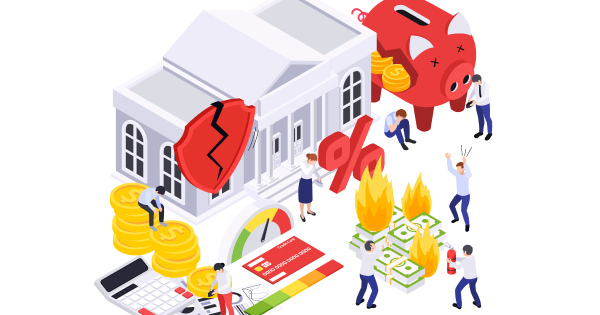Banking Chain Explosions Wake-up Call
Only two weeks after the USDC decoupling incident, there has been a revolutionary change in the traditional financial world with chain bank failures and bank bond values plummeting overnight. On March 12, the Federal Reserve and Federal Deposit Insurance Corporation (FDIC) released an emergency statement assuring depositors that they will guarantee banks such as Silicon Valley Bank, and that 100% of deposits are retrievable. This statement helped calm depositors, and the USDC, which was affected by the incident was re-pegged to the US dollar.
However, the incident has caused public confidence in banks to plummet, and runs on banks have spread to countries worldwide. This culminated on March 19 when the Credit Suisse Group declared a state of emergency, requiring either a central bank bailout or declaring bankruptcy and liquidation.
Credit Suisse’s long-term competitor UBS Group AG responded swiftly, acquiring its long-term competitor Credit Suisse Group for over $3 billion in just two days, saving it from bankruptcy. To complete the transaction, the Suisse National Bank provided UBS Group AG with over $9 billion to cover the potential losses from acquiring Credit Suisse, in addition to lending over $100 billion in working capital. UBS has taken advantage of the situation, becoming the hero that saved the depositors and shareholders of Credit Suisse, while its long-term competitor fell overnight.
Unfortunately, while Credit Suisse was saved, a group of their bondholders became scapegoats and had to bear all the losses. UBS Group AG was willing to acquire Credit Suisse with the condition that the regulatory agency writes off Credit Suisse's $17.3 billion Additional Tier 1 (AT1) capital bond. As Credit Suisse’s AT1 debt fell to zero, this caused mass panic-selling in the AT1 market, as other holders feared the same would be done to their own bonds, resulting in the AT1 capital bond value plummeting overnight.
Bitcoin Whitepaper
"Commerce on the Internet has come to rely almost exclusively on financial institutions serving as trusted third parties to process electronic payments. While the system works well enough for most transactions, it still suffers from the inherent weaknesses of the trust based model. A purely peer-to-peer version of electronic cash would allow online payments to be sent directly from one party to another without going through a financial institution.”
During the Credit Suisse takeover and the AT1 “bond death” the price of Bitcoin was not negatively affected and rose from under $20,000 to $27,000. The market explanation for this rise is that it was due to funds seeking refuge. However, I believe that this is a wake-up call for decentralized finance... Is your property truly yours?
Additionally, the article discusses the potential benefits of decentralized finance (DeFi) and the use of blockchain technology in financial transactions. It suggests that the recent events in the traditional financial world may lead more people to consider DeFi as a viable alternative, as it allows for peer-to-peer transactions without the need for a trusted third party like a bank.
Overall, the article presents a grim picture of the current state of traditional banking and finance, highlighting the risks and pitfalls that investors and customers may face. At the same time, it also suggests that there may be alternatives to the current system and that the rise of DeFi and blockchain technology may offer new solutions to these challenges.





